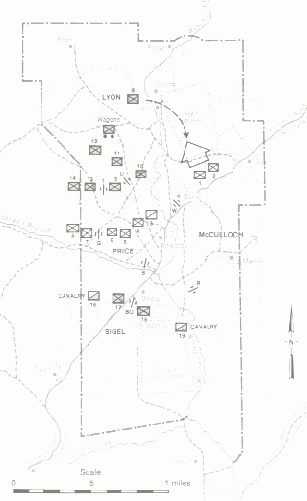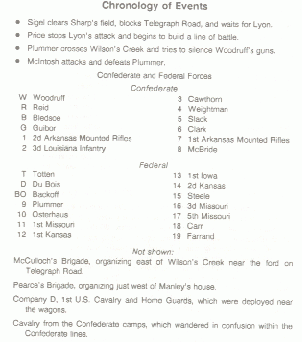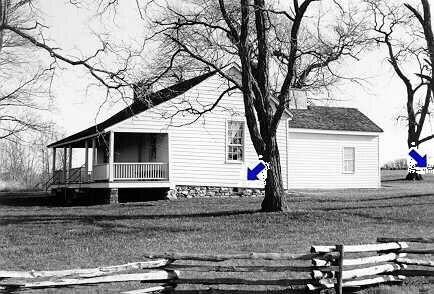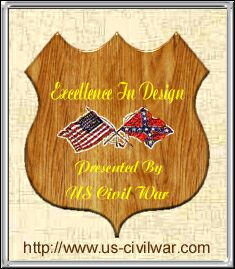 |
|

courtesy
"The Wilson's Creek Staff Ride and Battlefield Tour" by Major George Knapp
and published by Combat
Studies Institute. The US Army and the National Guard use battlefields
like Wilson's Creek to assist in teaching military history to its
officers. |
|
 Plummer Plummer
Our advance
was in the direction of the enemy's battery, on the hill opposite Lieutenant
Du Bois' battery, with the intention of storming it, should the opportunity
offer. This was observed by the enemy, and a large force was accumulated
in our front....

 Watson Watson
The opposing
forces approached the fence about the same time. As we got to within 20 yards
of it on the one side, their skirmishers would be about 20 yards from it
on the other side, the main lines on both sides being about 30 yards in the
rear of their skirmishers....The skirmishers were now ordered to deploy in
front, and fight their way up to a rail fence which formed the boundary between
the copse and the corn-fields beyond, where the enemy was forming their
line.
 Under
Both Flags
Under
Both Flags
The fence
was lined with briars and weeds, while beyond was a level stretch of ground
studded with brush, thick and dark with foliage, and there, at a distance
of about one hundred and fifty yards, the enemy lay.

 Watson Watson
"Who
are you? What force is that? cried a voice from our side, which I think was
our Colonel's. "United States troops," was the reply. This was said in a
tone so authoritative that I confess it for a moment almost staggered me.
It seemed to say, this is authority, so lay down your arms and go home. The
sudden appearance close before us of the men and officers with whom we had
always been so friendly, and had respected so much, and with whom we had
paraded a year ago at the baton rouge fair, took me slightly aback.....it
was quickly dispelled by the words which followed, which were, "Who are you?
Volunteers?" This last word was uttered with such scorn and bitterness, that
I believe it roused the spirit of every men in our ranks....
 |
Capt
Charles Gilbert
Co B
1st US
Infantry |
General
Officers of the Civil War
 Gilbert Gilbert
So soon
as I brought my line to a halt at the Osage Orange hedge, I passed the order
along the line by a low command for the men to fire kneeling and then paused
for developments on the other side.

 Watson Watson
"Volunteers!"
cried a United States officer, with supreme contempt, "Pitch into them, boys,
and clear them out of your way!"...The fire opened from both sides about
the same moment, and our first Lieutenant, with whom I was talking at the
moment, dropped at my knee, with blood streaming from his neck.

 Hyams
Hyams
Drum-Major
Patterson, of Pelican Rifles, left his drum, and with his rifle shot the
first man of the enemy killed....

 Watson Watson
We had
certainly the advantage of being in the brushwood, for, although it did not
reach higher than our shoulders. Yet the men stooped when loading, and for
a time were hid from the aim of the enemy; but in a short time the smoke
got so thick that sure aim could not be taken on either side....The order
had been for the skirmishers to fall back on the main body, which had now
approached to within 15 yards of them. The fire from our rear passing so
close over our heads soon warned us to fall back upon the main line. About
the same time and in the same way the enemy's skirmishers fell back on their
main line, and the battle now began in true earnest.
 Under
Both Flags
Under
Both Flags
"Aim
between the rails on a level two feet above the ground," was passed along.
The Confederates also improved in their work, and it was not long before
those mournful sounds arose to the right and left, which when heard can never
be forgotten. Both sides were armed with muzzle-loading smooth-bores, which
carried three buckshot and a ball. They were formidable weapons at close
range when well aimed, but we could see nothing.

 Watson Watson
The enemy
were better armed than we were. They were of good metal and well disciplined,
and maintained their phalanx by closing up to the centre. They stood upright,
and preserved their line well formed. This was fatal to them. Our line was
not so well disciplined, but they were so resolute and were better marksmen,
and the fighting being at close quarters the difference of arms was not much
felt.
 Gilbert Gilbert
Very
good, thought I, you have shot guns and squirrel rifles and we have buck
and ball with high grade powder behind them. We can stand it, if you can.
Soon, however, Howard (now Capt Carter?) came back to show me that he had
been hit in the shin by a small bullet. At about the same moment, I observed
the march along the side of the field to our left and that soon to come under
a cross fire and suggested that howard had better take shelter in the bed
of the creek and make his way to safety.
(Interesting
note - Gilbert's brother in law was somewhere in the opposing Arkansas
troops)

 Watson Watson
Both
sides were piqued and determined. It was now a fair stand-up fight, and the
question was who would stand it longest. The fire was heavy on both sides,
and the bullets rattled like a hailstorm.
 Gilbert Gilbert
The reb
troops that marched along the the side of the cornfield to my left has shown
about as much as two companies. When Capt Plummer reached me and they had
been seen by Dubois and had thrown some shells which exploded very high.
So much so that I imagined at first that they were intended for Woodruff's
guns. But a moment later they seemed directed at the infy now marching along
the side of the field to come up parallel with the infy. But they seemed
to have not seen the left of my skirmish line or to have disregarded it leaving
us to the care of the troops with whom we were engaged...So I told Sergt
Walsh (an Irishman) to creep up to the hedge and look through. As he could
not see stooping, he'd straightened up nearly at full height and pulling
aside the branches peered through, but almost immediately he grasped his
gun and came running back with his hand up to one ear which was bleeding.
He exclaimed "They are not Dutch, they are naigers." I then gave the order
to commence firing, the men aiming about breast high. The other side now
also opened, and soon the leaves and small branches began to fly from the
top of the hedge.
Note
- It is thought the term "naigers" is referring to some of McIntosh Arkansas
troops, which included a few native Americans and 'half breeds'. At least
one full blood Cherokee Indian from Arkansas is known to have died in the
battle - John Benge. According to W.Craig Gaines, author of "The Confederate
Cherokees: John Drew's Regiment of Mounted Rifles" there was at least one
company of full blood Cherokee Indian's fighting at Wilson's
Creek.
 |
Stan
Watie Chief of the Cherokee Nation
later
General in CSA Army
Some report
was an observer with McCulloch at Wilson's Creek, but doubtful |
photo
courtesy of "Cherokee Images"

 McIntosh McIntosh
I moved
forward with it to the front, going through a terrible fire of grape shot
and shells, until I reached the Louisiana regiment. I immediately dismounted
my men, and ordered them to face to the left and attack the right of the
enemy. I led them through a dense thicket to a fence surrounding a corn field,
where we became closely engaged with the enemy. My men and those of the Louisiana
regiment were suffering from a deadly fire.

 Watson Watson
Col.
McIntoch, pointing to this opening, which might be about 60 feet wide, said,
"I see the enemy's cavalry yonder in rear of the infantry, take care that
they don't pass in through that opening; and mind, that is my regiment that
is in front on your left, take care and not fire into it." The copse was
low and easily got through, and we could see the enemy's line advancing in
beautiful order, with skirmishers in front.
 |
Capt
David Stanley
US
Cavalry |
General
Officers of the Civil War
(The
mounted men held to the rear were the Phelps Home Guard and a US Cavalry
company, led by Capt David Stanley, that had been detailed to guard the union
supply wagons and rear flanks)
 Wood
Wood
Once
looking backward I did see some mounted troops in our rear. These I presume
were the home guards, but they took no part in the action in support of our
battalion.
Union
reserves are brought up/cornfield
 Under
Both Flags
Under
Both Flags
When
about three hundred yards from the enemy, the experts of the 2d Arkansas
began to try their skill at our ranks, but they aimed too high. Many corn-tops
fell at our feet and some of the bayonets were struck, but no complaints
were heard among the men. The whistling bullets increased in number as we
advanced, and arriving close to a rail face, which hemmed in the cultivated
part of the valley, "Halt and commence firing" was heard, when we knelt down
to our work.

 Watson Watson
The
Sergeant-Major came up to me to deliver some order, but I could not hear
it for the firing; he was coming closer to repeat it, when he fell shot
dead.
 Under Both Flags Under Both Flags
The tumult
was deafening. The loud moans of those who were struck in the stomach, the
sharp cries of pain whose bones were broken, and the curses of those who
received slight wounds filled the air and increased in volume as the fight
went on.

 Tunnard Tunnard
...Far
above the crashing of the small-arms, could be heard the stern, clear tones
of the gallant Colonel (Hebert) urging on the Louisiana Regiment: "Steady,
my men - steady!"
 Under Both Flags Under Both Flags
The voice
of Captain Plummer was ever in our ears. He passed constantly along the line
in rear of the battalion. "Keep cool, my boys, you are doing well, you are
mowing them down!" He would cry out at times. And he attracted swarms of
bullets which rattled in the cornfield like drops of rain driven by violent
winds.

 Tunnard Tunnard
...A
large dark-and-tan-colored dog (had) attached himself to the regiment, and
soon became a universal pet. When on the march he invariably trotted along
the road a few paces in advance of the van, and hence earned the sobriquet
of "Sergeant." He seldom left his position in front of the moving column,....On
the morning of the battle..."Sergeant" was on hand to participate in the
events of the day. Amid the storm of leaden bullets and the fierce rattle
of musketry in the first close deadly and obstinate engagement with the enemy,
"Sergeant" charged through the bushes, leaping over logs and obsticles, barking
furiously all the time.....shouted at him, "Get off of that sergeant, you
d--d fool, you'll be killed." The words were scarcely uttered ere a fatal
ball struck him, and with a long piteous whine....The intelligent animal
fell among the prostrate forms of many who had fed and caressed him....
 Under Both Flags Under Both Flags
...In
a moment of frenzy he(Plummer) determined to cross the fence. A bugler was
called to sound the advance, but the bugler was found to be dead. Plummer,
then attempted to dash through the ranks, sword in hand, and lead a charge
in person. But he had barely undertaken the task when a bullet shattered
one of his ribs....Now and then...a bold man in gray came on with a yell
but he met with instant death.....Quarrels broke out among the men, for those
in front complained that their cheeks were singed by the fire of their companies
in the rear rank; and ramrods which had been left on the ground for convenience
were taken up by others and not promptly returned.....The splendid motions
we had been taught at drill and parade in anticipation of this bloody day
were not practised here. Each man assumed a position to his liking - most
of the men on their knees and leaning well forward.

 Watson Watson
The firing
was desperate for about half-an-hour, when a sort of a lull took place as
if by mutual consent, to draw breath and let the smoke clear away. When the
smoke cleared away a little we could see the enemy plainly. They stood as
firm as ever, but their ranks were such thinned and their dead lay thick.
Their officers, who had been crying, "Pitch into them, boys!" were now hushed.
Some of them had been slightly wounded in the head, but they still stood
in their places, while the blood running down their faces gave them a ghastly
but fierce and determined look.
 Gilbert Gilbert
Now there
is a rule....to the effect that when a position is compromised withdraw in
time to effect the retreat in good order.
 |
Capt
Jerome Gilmore
Co F
3rd La
Infantry |
photo
courtesy of "3rd Louisiana Infantry History"

 Watson Watson
"How
about volunteers now?" cried several voices from our side. This was answered
vindictively by a volley, and the battle commenced again with renewed
vigor.
 Wood (quoting
Gilbert) Wood (quoting
Gilbert)
In closing
on our center [with his company] I crossed the creek and ascended the hill
far enough to be out of range of the shot guns and squirrel rifles of our
adversaries of the Osage Orange hedge, and then I stopped to collect the
men who had followed me, and in the meantime I took a view of the ground
the battalion had occupied. It was vacated except by the dead and badly wounded
and a squad of the men in dark blue. [the Rifle Recruits] they were still
firing.... Perhaps because their commander did not hear the order given to
retire, these recruits steadfastly remained bravely fighting, although one-half
their number was disabled, until his attention was called to the fact by
exclamations by several of the recruits that the battalion had left them.
About this time Captain Plummer rode up and very peremptorily ordered this
company to the rear, otherwise I think we should have stayed, to be planted
there, or perhaps captured.

 Watson Watson
"They
were mad with desperation, and began to cry, "Come out and meet us in the
open field." "Charge them with the bayonet!" Cried a voice near me. "Give
them the cold steel, boys!" Resounded along the line, and with a tremendous
cheer we rushed out upon them.
 Gilbert Gilbert
Soon
Capt Plummer rode up and announced that we must get out of this pocket...For
as he was speaking, Heberts men were climbing over the fence on the left
of the cornfield...

 Watson Watson
They
broke...but some stood still in line, seemingly dumbfounded, and were pushed
down and run over by our men as they followed the retreating body, but I
don't think a single man was bayoneted: our men were too excited and exhilarated
with their success to notice them.
 Under Both Flags Under Both Flags
...The
Confederates, with a great shout, emerged from their cover, and as their
long line neared the fence.....The battalion began to break and finally gave
way.

 Watson Watson
One young
officer stood holding a small flag or marker on their line. I ran to seize
the flag from him. He with his sword inflicted a slight wound on my wrist.
I closed with him, but found the poor fellow was already sorely wounded,
and he fell fainting on the ground, still holding on to the flag. I left
him; and, not wishing to be left behind, ran up and joined my company, which
had passed on, following up the retreating enemy.
 |
Lt
Henry Clay Wood
Rifle
Recruits |
 |
photo
courtesy of "Blue and Gray" Vol V, No 4 April 1895 and Wilson's Creek National
Battlefield
 Wood
Wood
I do
recall a rebel yell, and I do not wonder at their gratification and joy that
the deadly fire of this little band of Regulars had ceased.
 Gilbert
Gilbert
In mil
parlance the cornfield was a bloody angle. From the ground (we) came under
a close cross fire of infy with artillery firing along the diagonal. Troops
unprotected on such ground are doomed to slaughter. A com'g officer in possession
of his senses must draw off his men. Plummer did not give as an excuse for
retreating that the shells of our guns were killing our men. He merely mentioned
the fact as an incident of the situation.
 Under Both Flags Under Both Flags
Dubois,
on the left of Bloody Hill, had all along watched the affair in the cornfield
and instantly opened his four cannon upon the victorious enemy and drove
them in confusion out of range; the wounded we had left behind coming in
for a share of the danger.

 Watson Watson
We followed
them up towards the base of oakhill, but we were then checked by a storm
of shrapnel and grape, which was opened upon us from a battery on the enemy's
left.
 |
Captain
Gordon Granger
Asst Adjutant
General to Lyon |
photo
courtesy of General Officers of the Civil War
 Dubois Dubois
The enemy,
reinforced by a regiment, drove us back in turn. They were ten to one now.
Seeing this...Captain Granger now countermanded my order to move, and by
a change of front to the left I enfiladed their line and drove them back
with great slaughter, Captain Granger directing one of my guns. ...A few
rounds of spherical case defeated them with some loss...

 Wilkie
Wilkie
One single
shell burst exactly in the center of what seemed a large crowd of human beings,
and the next instant not a soul could be seen in the vicinity. In a few minutes
not a man of the enemy who could get away, remained in the cornfield....The
distance was not more than two hundred yards and the effect was frightful
- it was not simply killing men, it was wholesale massacre.
 Dubois Dubois
Their
broken troops rallied behind a house on the right of their line. I struck
this house twice with a 12-pounder shot, when they showed a hospital flag.
I ceased firing, and their troops retired.

Take
a virtual tour of the Ray house
The south
face of the John Ray house as it appears today. The arrow on the left designates
the location of the cellar entrance in 1861, and the arrow on the right
designates the approximate location of the chicken house. The window above
the first arrow is the bedroom where the NPS says the body of Gen. Lyon would
be laid after the battle. This was probably done for tourism logistics as
most evidence points to the left front room actually being the family bedroom
and more likely where General Lyon was laid. John Ray is said to have sat
on the front porch and watched the entire battle. While an extremely interesting
story, and adopted as fact by the NPS, there is no evidence that this actually
happened except from the memoirs of the 6 year old girl, who was in the cellar
during the battle.
(courtesy
NPS) |
 Bruton
Bruton
"The
older boys, anxious to see what was taking place kept trying to steal a glance
by opening the cellar door. Finally one of the men Julius Short, the mail
carrier, became so bold as to open the door, only to have it slammed in his
face from the concussion of a bomb that crashed through our chicken house
a short distance away.

 Watson Watson
Just
at this moment General McCulloch came galloping up, and, addressing the regiment,
commended them for their bravery, and pointing to a battery on the enemy's
right, said it must be stormed....The sky had suddenly darkened down, which
showed the red flashes of the artillery through the smoke, while the hissing
of shells and the continued crackle of small arms made the scene look grand,
though not altogether pleasant.
|

